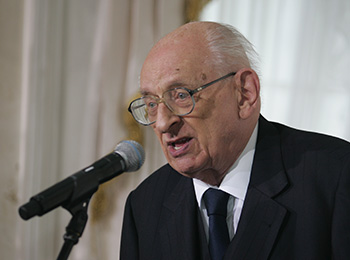In the annals of the literature on the Holocaust, a special place is reserved for the relatively small number of gentiles who risked everything to try to save Jews from certain death. Foremost among them was Wladyslaw Bartoszewski, who died on April 24.
Bartoszewski was an academic, journalist, social activist, politician, and a saviour of Jews. He was born in 1922, and during the civil defence of Warsaw during the German invasion, worked as a stretcher bearer in the Polish Red Cross. In September 1940, he was arrested by the Gestapo and interned at Auschwitz (number 4427), and was released seven months later due to the efforts of the Red Cross.
He then joined the Department of Information of the underground Polish Home Army (AK) and was a student in the secret University of Warsaw. In 1942, as soldier in the AK, he joined the Council for Aid to Jews (codename: Zegota) where his duties included providing assistance to Jews in the Paviak prison in the Warsaw Ghetto and then to the rebels of the Ghetto Uprising in 1943.
After the war, with the imposition of Communism, he was arrested for being a spy, and spent seven years, in Polish prisons. He was pardoned in 1955, resumed his career as a journalist and student, but was expelled from the university in 1962. He spent part of the following year in Jerusalem, where he accepted the diploma of Righteous Among the Nations on behalf of Zegota. Three years later, he was accorded the same status.
For the next 25 years, he was a journalist and professor of history in Poland, Austria and Germany, and received honorary doctorates from several universities in Poland and abroad. Aside from hundreds of articles, he wrote approximately 20 books on Polish history, the majority of which focused on the Holocaust in Poland. Four of them have been translated into English, the most recent being The Jews of Warsaw: A History, (1991) an edited collection with Antony Polonsky, the foremost scholar of modern Polish Jewry.
With the fall of the Communist regime in 1989, he was appointed ambassador to Austria and five years later, minister of foreign affairs. Since then, he has lectured worldwide in Polish and German, as chair of the Council on the Auschwitz Museum and of the Polish branch of PEN, and was the recipient of many honours, including being made an Honorary Citizen of Israel.
Bartoszewski has had a direct impact on the dissemination of the history of Polish Jews and Polish-Jewish relations in Canada. His son, Wladek, was my colleague at St. Antony’s College, Oxford, in 1987-8, where I was a visiting scholar and he was doing a post-doc on Polish-Jewish relations. He invited me to a conference at Hebrew University where I met his father. Upon my return to Toronto, I was invited to join a group to establish The Polish-Jewish Heritage Foundation of Canada, with chapters in Toronto and Montreal.
The title of one of his books, It’s Worth Being Decent (my translation), sums up his universalist prescription for humanity. Bartoszewski is one of the heroes of the past century, a man dedicated to combating hatred, who paid the price for opposing Nazis and Communists, and who was unflinching in his message of compassion and historical accuracy, to almost his last breath. He died of a heart attack, the day before addressing an international audience on the 25th anniversary of the friendship pact between Germany and Poland. May his legacy be spread, and may his memory be for a blessing.
Franklin Bialystok teaches modern Jewish history at the University of Toronto.
